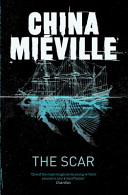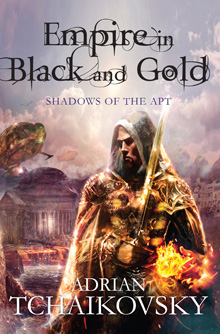The last time I spent extended time in London, lo 10 years or more ago, I brought back the Malazan Empire books. Possibly thanks to Jess Nevins, I can’t recall. It was certainly a worthwhile haul in any case. This time I fine-tuned the process; Susan and I hit Forbidden Planet in the company of Catie and Ted, and we picked up a few first novels in various series which are not so readily available in the United States. We also controlled the urge to pick up some books you can easily get over here but which have much better cover treatments in Great Britain.
 I mean, really. And there are corresponding designs for every Miéville book. Or how about the lovely minimalist Gollancz 50th collection? Fortunately we retained some modicum of willpower, if only to justify our later extravagance.
I mean, really. And there are corresponding designs for every Miéville book. Or how about the lovely minimalist Gollancz 50th collection? Fortunately we retained some modicum of willpower, if only to justify our later extravagance.
Which is to say: after reading the aforementioned first novels we decided which ones we really liked and would have trouble finding in the States, and went back later in the week and splurged. Ben Aaronovitch’s Rivers of London series would easily have made the cut, but they’re readily available here. (Important note: Midnight Riot is the first book in the series, originally titled Rivers of London in the UK.) Paul Cornell’s London Falling is awesome but there is no more to buy at present.
There is no shortage of British novels about ordinary people falling into a fantasy world just beneath the skin of the London we know and love, huh? I’m surprised Cubicle 7 hasn’t done an RPG along those lines. Perhaps The Laundry counts.
 Anywise, the exciting find was Adrian Tchaikovsky’s Shadows of the Apt series. There are eight of these in print in the UK; I now have seven. Only five of them are available in the US. I am a bit concerned about that since the fifth one came out in the US over a year ago; sales may not have been good enough to justify more. This would be a shame! On the other hand, the series will end at 10 books, all of which have been turned in, so even if I have to go to Chapters or Amazon UK it’ll work out for me.
Anywise, the exciting find was Adrian Tchaikovsky’s Shadows of the Apt series. There are eight of these in print in the UK; I now have seven. Only five of them are available in the US. I am a bit concerned about that since the fifth one came out in the US over a year ago; sales may not have been good enough to justify more. This would be a shame! On the other hand, the series will end at 10 books, all of which have been turned in, so even if I have to go to Chapters or Amazon UK it’ll work out for me.
The setup is a fantasy world in the very early stages of an Industrial Revolution. There’s a barbaric empire roaring down from the north with an eye towards conquering the Lowlands. The Lowlands, of course, are unconvinced of the real danger. There are spymasters and assassins and artificers and lots of politics — it’s a very city-oriented series, which I like. I’m two and a half books in and I don’t think anything significant has taken place outside a city except one big battle.
Said Industrial Revolution and the concomitant fading of magic are the engines of change in the setting. The clever setting postulate is that humanity is divided into kinder, each with a special connection to some kind of insect: Beetle-kinder, Moth-kinder, Wasp-kinder, Spider-kinder, and so on. Some kinder are Apt, and can understand and use machinery. Some kinder are Inapt, and can’t even comprehend how a lock works, but can do magic. In parallel, each kinder has some abilities drawn from their insect connection, which are explicitly not magic. I suppose you could assume they were psychic if you felt like deconstructing it, but Tchaikovsky doesn’t feel any need to explain it.
Slight detour: if the Inapt were noble savages this would irk me. They aren’t. Spider-kinder are Inapt, for example, but they rule an advanced group of cities and have no objections to technology even if they can’t use it themselves. Moth-kinder live in isolated cities and are a shadow of what they once were, but that’s because they were once the fairly tyrannical rulers of the Apt. The Wasp Empire is an Apt empire that’s essentially still barbaric. There’s also no shortage of exceptions to the kinder stereotypes.
I get a bit of a K. J. Parker vibe from the books in that they’re examinations of change in a fantasy setting. The world’s going to be an awfully different place by the time these are done, and it’s not just that a Dark Lord will be overthrown. I don’t think I even have any certainty that the Wasp Empire is going to be defeated. On the other hand, they’re not as grim as a typical Parker book. Competence is a primary virtue, as it is in Parker’s work, but good is also pretty important and is even often rewarded.
They’re pretty sprawling books. Well, 10 in the series, that’s fairly obvious. The initial book is about Stenwold Maker, professor and spymaster, and his four proteges. It spreads out rather quickly after that, however. For reference points, I’d say there are fewer viewpoint characters than you have in Game of Thrones, and the books are closer related to one another than the Malazan Empire books.
The existence of the Inapt means that there’s plenty of justification for epic swordplay even while artificers are inventing dangerous new weaponry. I like books with larger-than-life swordplay, and the Mantis-kinder provide plenty of that. Secretive sect which specializes in combat with members who can take down groups of ten men? Check.
Finally, there are ornithopters and repeating crossbows.